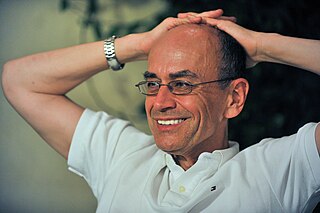
Sir Alan Roy Fersht is a British chemist at the MRC Laboratory of Molecular Biology, Cambridge, and an Emeritus Professor in the Department of Chemistry at the University of Cambridge. He was Master of Gonville and Caius College, Cambridge from 2012 to 2018. He works on protein folding, and is sometimes described as a founder of protein engineering.

Kim Ashley Nasmyth is an English geneticist, the Whitley Professor of Biochemistry at the University of Oxford, a Fellow of Trinity College, Oxford, former scientific director of the Research Institute of Molecular Pathology (IMP), and former head of the Department of Biochemistry, University of Oxford. He is best known for his work on the segregation of chromosomes during cell division.
Michael Samuel Neuberger FRS FMedSci was a British biochemist and immunologist.
Axel Ullrich is a German cancer researcher and has been the director of the molecular biology department at the Max Planck Institute of Biochemistry in Martinsried, Germany since 1988. This department's research has primarily focused on signal transduction. Ullrich has received Hamdan Award for Medical Research Excellence, awarded by Sheikh Hamdan bin Rashid Al Maktoum Award for Medical Sciences, Dubai, United Arab Emirates in 2008 and Ullrich and his team received the Wolf Prize in 2010.
Sir John Anthony Hardy is a human geneticist and molecular biologist at the Reta Lila Weston Institute of Neurological Studies at University College London with research interests in neurological diseases.
Veronica van Heyningen is an English geneticist who specialises in the etiology of anophthalmia as an honorary professor at University College London (UCL). She previously served as head of medical genetics at the MRC Human Genetics Unit in Edinburgh and the president of The Genetics Society. In 2014 she became president of the Galton Institute. As of 2019 she chairs the diversity committee of the Royal Society, previously chaired by Uta Frith.

Thomas Christian Südhof, ForMemRS, is a German-American biochemist known for his study of synaptic transmission. Currently, he is a professor in the school of medicine in the department of molecular and cellular physiology, and by courtesy in neurology, and in psychiatry and behavioral sciences at Stanford University.
William Charles Earnshaw is Professor of Chromosome Dynamics at the University of Edinburgh, where he has been a Wellcome Trust Principal Research Fellow since 1996.
Andrew Oliver Mungo Wilkie is a clinical geneticist who has been the Nuffield professor of Pathology at the University of Oxford since 2003.

Iva Marija Tolić is a Croatian biophysicist, known for her work on the microtubule cytoskeleton and associated motor proteins. She is currently Senior Research Group Leader and professor of Biology at the Ruđer Bošković Institute in Zagreb, Croatia.

Anne Jacqueline Ridley is professor of Cell Biology and Head of School for Cellular and Molecular Medicine at the University of Bristol. She was previously a professor at King's College London.

Ginés Morata Pérez ForMemRS is Research Professor at the Autonomous University of Madrid in Spain and an expert in developmental biology of the fruit fly (Drosophila), a specialty he has worked on for over 40 years.

Hanah Margalit is a Professor in the faculty of medicine at the Hebrew University of Jerusalem. Her research combines bioinformatics, computational biology and systems biology, specifically in the fields of gene regulation in bacteria and eukaryotes.
Charles Kenvyn ffrench-Constant FRCP FMedSci FRSE is a neurology researcher, specialising in multiple sclerosis. He has been recognised for his "fundamental and sustained contributions that underpin much contemporary research in developmental and regenerative neuroscience".
Robert Insall is the professor of computational cell biology at University College London and the University of Glasgow. His work focuses on how eukaryotic cells move, and how they choose the direction in which they move. He is known for demonstrating that cells can spread in the body and find their way through mazes by creating gradients of chemoattractants.
Elizabeth Gavis is an American biologist who is the Damon B. Pfeiffer Professor of Life Sciences, at Princeton University. Gavis served as the President of the North American Drosophila Board of Directors in 2011.

Irene Miguel-Aliaga is a Spanish-British physiologist who is Professor of Genetics and Physiology at Imperial College London. Her research investigates the plasticity of adult organs, and why certain organs change shape in response to environmental changes. She was elected Fellow of the Royal Society in 2022.
Susan Mary Lea is a British biologist who serves as chief of the center for structural biology at the National Cancer Institute. Her research investigates host-pathogen interactions and biomolecular pathways. She was elected a Fellow of the Royal Society in 2022.
Sophie Geneviève Elisabeth Martin Benton is a Swiss biologist who is Professor and Director of the Department of Fundamental Microbiology at the University of Lausanne. Her research investigates the molecular processes that underpin cellular fusion. She was awarded the EMBO Gold Medal in 2014.
Meritxell Huch is a stem cell biologist and director at the Max Planck Institute of Molecular Cell Biology and Genetics. Her research considers tissue regeneration and the development of tissue-specific disease models for human organs. She was awarded a European Research Council Consolidator Grant in 2023.








